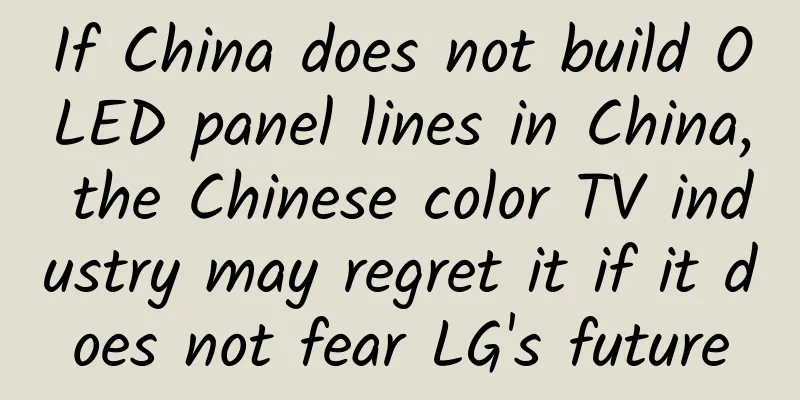If China does not build OLED panel lines in China, the Chinese color TV industry may regret it if it does not fear LG's future

|
As a core supplier of large-size OLED panels, LG Display's every move in the OLED field has an important impact on the entire industry. In particular, the establishment of an OLED panel factory is of great significance and far-reaching impact. Previously, Lu Xiangde, president of LG Display's OLED business unit, told the media that LGD will invest in a new OLED panel line in 2017, and does not rule out the possibility of producing an OLED production line in Guangzhou in the future. However, Ding Technology recently learned that LGD has ruled out the possibility of building an OLED panel line in China, and LG's overall business prospects in China may become even bleaker. LG's business prospects in China are worrying Reasons for not building an OLED production line From initially stating that it did not rule out building an OLED panel line in Guangzhou, China, to now clearly stating that it would not build an OLED panel line in China, what is the reason for LGD's sudden change in attitude? Judging from LGD's response to the media, the main reason is that the Korean government does not allow the export of patented technology abroad. This reason, at least on the surface, makes sense. Previously, Japanese technology company Toshiba wanted to sell its flash memory business, and also said that it was unwilling to sell this business to Chinese companies due to government reasons. In fact, Japanese and Korean companies have always been very cautious about technology exports in high-tech industries such as panels and chips. Ding Technology learned that previously, whether it was Samsung or LGD, the panel factories established in China had maintained that the generation of domestic production lines must be higher than the generation of imported production lines. For example, only when the domestic 10th generation line is put into operation will the 8th generation line or 8.5th generation line be built abroad. However, Ding Technology believes that in addition to government control, LGD itself may not have really made up its mind to build a large-size OLED production line in China. On the one hand, LGD's business in China is shrinking, and investing in a large-size OLED production line may not bring quick benefits; on the other hand, compared with large-size OLED production lines, small-size OLED screens are in more urgent demand and have better market prospects. Therefore, Ding Technology believes that in addition to government control, LGD's own hesitation and confusion based on corporate interests are the reasons why LGD is not currently building a large-size OLED panel line in China. LG's prospects in China are bleak Although Samsung's mobile phone and TV businesses in China are not as good as before, it still dominates the high-end market, with a solid foundation in terms of brand influence and product penetration. LG is completely different. Its mobile phones, which once sold well in China, have been marginalized in the Chinese market or have completely withdrawn from the Chinese market; its proud panel business has been surpassed by Chinese brand BOE in terms of large-size panel shipments; in terms of TV sets, LG can basically only rank outside the top 10, and its market share has been seriously squeezed by domestic brands. Ding Technology believes that LGD’s announcement that it will not build an OLED panel line in China is likely to cause the biggest loss to LG itself. China's independent OLED industry chain will be formed On the one hand, LGD may not be able to further cooperate with Chinese brands in terms of capital and business. The previous cooperation between LGD and Skyworth is a model of cooperation between upstream panel companies and downstream terminal companies. In the future, whether Samsung's quantum dots are in the mainstream or LG's OLED is booming, it will undoubtedly be difficult for LG to maximize its profits in the Chinese market. On the other hand, domestic panel companies may put greater competitive pressure on LG. In the field of large-size LCD panels, BOE has surpassed LGD. In the large-size LCD panel market in the fourth quarter of 2016, BOE surpassed LGD to become the first, with a market share of 22%, compared with only 16.4% in the same period last year, with an annual growth rate of 27.4%, and it is the only one of the top five manufacturers to grow. LGD fell from the first place last year to the second place, with a share of 19.1%, a year-on-year decrease of 14.7%. BOE is not only focusing on LCD panels, but also has begun to make efforts in the field of OLED panels. Last year, BOE signed an investment of 46.5 billion yuan to build the sixth-generation AMOLED (flexible) production line in Mianyang, Sichuan. The project is scheduled to start construction this year and be completed and put into production in 2019. Previously, BOE has built OLED panel production lines in Ordos, Chengdu and other places. In the field of large-size OLED panels, if LGD does not invest in panel production lines in China, it will undoubtedly provide BOE with a market opportunity. BOE has been in the OLED field for a long time In the entire OLED field, in addition to BOE and CSOT, domestic OLED panel companies such as Everdisplay Optoelectronics, Shenzhen Tianma, and Godisplay Optoelectronics are accelerating their investment in OLED panels. In the field of OLED, Chinese companies are actually not much behind Japanese and Korean companies. LGD's hesitation has given Chinese companies a greater opportunity. Once Chinese companies have made a complete layout in the fields of panels and complete machines, LG will probably only regret it when it wants to share the big cake of the Chinese market by relying on its technological advantages. As a winner of Toutiao's Qingyun Plan and Baijiahao's Bai+ Plan, the 2019 Baidu Digital Author of the Year, the Baijiahao's Most Popular Author in the Technology Field, the 2019 Sogou Technology and Culture Author, and the 2021 Baijiahao Quarterly Influential Creator, he has won many awards, including the 2013 Sohu Best Industry Media Person, the 2015 China New Media Entrepreneurship Competition Beijing Third Place, the 2015 Guangmang Experience Award, the 2015 China New Media Entrepreneurship Competition Finals Third Place, and the 2018 Baidu Dynamic Annual Powerful Celebrity. |
>>: The next stage of self-driving cars: You can take a nap in the car
Recommend
“Wildfires cannot be extinguished, spring breezes will bring them back to life” It turns out that this is because…
When it comes to wildfires, many people will thin...
That friend who keeps talking to you about “H5 marketing”, you don’t need to see him anymore!
I have been working in the marketing field for ma...
OLED is on the way out, and the quantum dot era is opening up in the global color TV industry
At this stage, OLED TVs have not yet entered the ...
Amazon's entry into Tmall leaves three major suspense
Amazon quietly entered Tmall, seemingly not wanti...
Jinan SEO training: What is SEO promotion? How to understand search engine optimization?
What is SEO Internet promotion? It is the most he...
When the museum’s treasures started playing with clay filters, I realized that introducing cultural relics could be so interesting!
Recently, the "clay filter" has been ve...
In future wars, small animals can also play a big role
Humans are the only intelligent creatures on Eart...
Linger "Core Leader Strategy" Linger Investment Research Diary
Ling'er "Core Leader Strategy" Ling...
Review of 4 private domain traffic live broadcast cases
All brands are paying close attention to private ...
Advertising expression strategy: I summarized 15 ways to express advertising
Last week, a reader sent me a private message: &q...
Luo Rong: "Reshaping Financial Value and Enabling Business Growth"
Luo Rong's "Reshaping Financial Value an...
These pure milk samples failed the test! Excessive consumption may cause...
Recently, the Market Supervision Bureau of Qingyu...
Solution Consulting · 2021 Hot Product Solution + Industry Solution Teacher Zhang Yang will take you through the report
Solution Consulting · 2021 Hot Product Solution +...
Where is the Changsha Tea Club located? How can I contact you for high-end part-time takeaway and tea drinking?
Where is the Changsha Tea Club located? How to co...
China Passenger Car Association: China's auto imports will reach 799,000 units in 2023, down 10% year-on-year
According to recent news, Cui Dongshu, secretary-...









